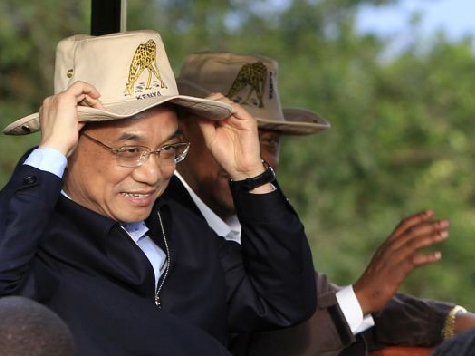
China agreed to fund a $2 billion multi-lateral investment fund in cooperation with the African Development Bank. The move is a departure from China’s former “cheque book” policy of investing directly in individual countries.
Beijing appears to be forming the “Africa Growing Together Fund” this week as a vehicle to undermine the financial leverage the European Union has held over their former colonies for the last 150 years. China wants to dominate its international supply chain and is willing to pay-to-play in order to win in Africa.
The African Development Bank, the UN, and the OECD painted a rosy outlook for the continent in their “African Economic Outlook” annual report. Foreign direct investment in Africa has recovered from the effects of the global financial crisis, the report stated. Investment is expected to rise to a new all-time high of 84.3 billion in 2014.
China has been Africa’s biggest trade partner since 2009. Bilateral trade stood at under $11 billion in 2000; by 2006 the level had jumped to nearly $60 billion and by last year the trade exceeded $210billion.
To support this commerce, Chinese investments in African countries have risen by 3,000% in the last decade. Foreign direct investment went from $500 million in 2003 to almost $15 billion by 2012. China had pledged $20 billion for infrastructure development last year – almost 25% of all foreign direct investment.
Chinese Premier Li Keqiang acknowledged during his first trip to the continent in early May that the relationship between Beijing and its African partners had suffered what he called “growing pains.” But he rejected accusations that Beijing was pursuing a neo-colonialist policy in Africa.
“I wish to assure our African friends, in all seriousness, that China will never pursue a colonialist path like some countries did or allow colonialism, which belonged to the past, to reappear in Africa,” he said. “For China and Africa, co-operation means opportunities, co-operation is win-win,” he said.
The new fund is supposed to open development contracts to the most competitive bidder, rather than just to a number of favored Chinese companies. The United States and European Union countries have been increasingly vocal that Beijing’s “cheque book” policy largely benefited its own construction groups, which have built everything from roads to hospitals on the continent. Even African officials are now criticizing the policy for poor quality of construction in much of the Chinese-built infrastructure that relied on migrant labor from China rather than local workers.
In what is considered a rare criticism by a senior Chinese official, Zhou Xiaochuan, governor of China’s central bank, said that some past deals by Chinese companies and agencies in African countries hadn’t been made in acceptable ways.
China clearly needs Africa as a source of raw materials and food production. In the past, China has been able to “win” by doing business quietly with Africa’s often-corrupt officials. But as China seeks to dominate its supply chain, funding large multi-lateral deals is the cost of doing business to push their Western competitors out of the way.
***
The author welcomes feedback and will respond to comments by reader.

COMMENTS
Please let us know if you're having issues with commenting.